Introduction
Firefighter training plays a crucial role in saving lives and property during fire emergencies.
In the Nigerian context, where fire incidents are common, there is a pressing need for comprehensive firefighter training courses.
These courses aim to equip individuals with the necessary skills and knowledge to effectively respond to fire incidents and minimize the associated risks.
The importance of firefighter training cannot be overstated. It enables firefighters to handle various fire situations, including rescue operations, hazardous material incidents, and structural firefighting.
With proper training, firefighters can confidently perform their duties, ensuring the safety of themselves and the public.
In Nigeria, the need for firefighter training courses is paramount due to several factors.
Firstly, the country experiences a high incidence of fire outbreaks, resulting in significant losses of lives and property.
These incidents highlight the urgency to enhance firefighting capabilities through training.
Secondly, the rapid urbanization and industrialization in Nigeria have increased the risk of fire incidents.
As cities expand and industries grow, the potential for fire accidents escalates.
Firefighter training becomes crucial in preparing professionals to effectively respond to emergencies in these evolving landscapes.
Furthermore, firefighter training courses also address the lack of standardized firefighting procedures and equipment in Nigeria.
By providing comprehensive training, individuals will be able to handle modern firefighting equipment and adhere to internationally recognized best practices.
In essence, firefighter training is of utmost importance in Nigeria.
As the country continues to face fire incidents, it is crucial to invest in training programs that equip individuals with the necessary skills to tackle these emergencies effectively.
By doing so, lives can be saved, and property damage can be minimized.
Types of Fire Fighter Training Courses
A. Basic Fire Fighter Training
1. Description and objectives of the course
The basic fire fighter training course provides essential knowledge and skills to begin a career in firefighting.
Its main objective is to equip trainees with fundamental firefighting techniques.
2. Skills and knowledge covered in basic training
This course covers a range of skills including fire suppression techniques, handling fire-fighting equipment, rescue operations, emergency medical response, and understanding fire behavior.
3. Duration and prerequisites
The duration of basic fire fighter training varies, but it usually spans several months.
Prerequisites for enrollment may include a minimum educational qualification, physical fitness, and the ability to swim.
4. Examples of institutions offering basic fire fighter training courses in Nigeria
Institutions such as the Nigeria Fire Service Training School, Nigerian Civil Defense Academy, and National Fire Academy offer basic fire fighter training courses in Nigeria.
B. Advanced Fire Fighter Training
1. Description and objectives of advanced training
Advanced fire fighter training is designed for experienced firefighters who want to enhance their skills and knowledge in specialized areas of firefighting. The objective is to equip them with advanced techniques.
2. Specific skills and knowledge covered in advanced training
This training focuses on advanced fire suppression tactics, hazardous materials handling, incident command systems, high-angle and confined space rescue, and advanced emergency medical techniques.
3. Duration and prerequisites
The duration of advanced fire fighter training varies depending on the specific program, but it typically ranges from a few weeks to several months.
Prerequisites may include completion of basic training and certain years of experience.
4. Institutions offering advanced fire fighter training courses in Nigeria
Institutions such as the Nigerian Fire Academy, Federal Fire Service Training School, and State Fire Services offer advanced fire fighter training courses in Nigeria.
In general, fire fighter training in Nigeria is divided into two main categories: basic and advanced.
The basic training provides trainees with essential skills and knowledge to start their careers in firefighting, while advanced training is for experienced firefighters aiming to enhance their expertise in specialized areas.
Both types of training courses are offered by various institutions across the country, ensuring the availability of well-trained firefighters to effectively respond to fire emergencies.
Read: Sustainability: Eco-Friendly Coating Practices in Nigeria
Certification and Accreditation Process
A. Importance of Certification for Fire Fighters
- Certification ensures that fire fighters have the necessary skills and knowledge to handle emergencies effectively.
- It provides credibility, as certified fire fighters are recognized for their expertise and professionalism.
- Certification also helps in career advancement, as many organizations require it for promotional opportunities.
- Moreover, it enhances public trust and confidence in the abilities of fire fighters.
B. Overview of the Accreditation Process in Nigeria
- The accreditation process ensures that fire fighter training courses meet relevant standards and criteria.
- It involves a thorough evaluation of the curriculum, instructors, facilities, and training methodology.
- Accreditation is usually carried out by independent accrediting bodies or government agencies.
- The process includes site visits, assessments, and documentation reviews to determine compliance.
C. Key Organizations Responsible for Certifying and Accrediting Fire Fighter Training Courses in Nigeria
- The Federal Fire Service (FFS) is the primary organization responsible for certifying fire fighters in Nigeria.
- They establish the standards, guidelines, and requirements for fire fighter certification.
- The Nigerian Civil Defence Corps (NSCDC) also plays a significant role in accrediting fire fighter training courses.
- These organizations work closely with the Fire Service Training Institutes (FSTIs) across the country.
D. Explanation of the Certification Levels for Fire Fighters in Nigeria
- In Nigeria, fire fighters can obtain different levels of certification based on their skills and experience.
- The entry-level certification is the Basic Fireman Certificate, which provides the foundational knowledge and skills.
- Fire fighters can then progress to obtain the Intermediate Fireman and Advanced Fireman Certificates.
- The highest certification level is the Chief Fire Officer Certificate, which signifies expert-level proficiency in fire fighting.
Certification and accreditation are crucial aspects of fire fighter training in Nigeria. They ensure that fire fighters are well-prepared to tackle emergencies and maintain public safety.
By obtaining certifications, fire fighters demonstrate their competence and commitment to their profession.
The accreditation process guarantees that training courses meet industry standards, enhancing the quality and effectiveness of the programs offered.
The Federal Fire Service (FFS) and the Nigerian Civil Defence Corps (NSCDC) are the key organizations responsible for certifying and accrediting fire fighter training courses in Nigeria.
They work in collaboration with the Fire Service Training Institutes (FSTIs) to ensure that the training provided aligns with the set standards.
These organizations conduct site visits and assessments to evaluate the curriculum, instructors, and facilities.
Certification levels in Nigeria range from the Basic Fireman Certificate to the Chief Fire Officer Certificate.
Each certification level represents an increase in skills and expertise.
Fire fighters start at the entry-level and progress through intermediate and advanced certifications, showcasing their continuous growth and development in the field.
In short, certification and accreditation play a vital role in the fire fighter training process in Nigeria.
They provide credibility, career advancement opportunities, and public trust.
The Federal Fire Service, the Nigerian Civil Defence Corps, and the Fire Service Training Institutes work collaboratively to ensure that fire fighters receive standardized and quality training.
By obtaining different levels of certification, fire fighters demonstrate their proficiency and dedication to serving their communities.
Read: Workshops & Events: Coating Tech Education in Nigeria
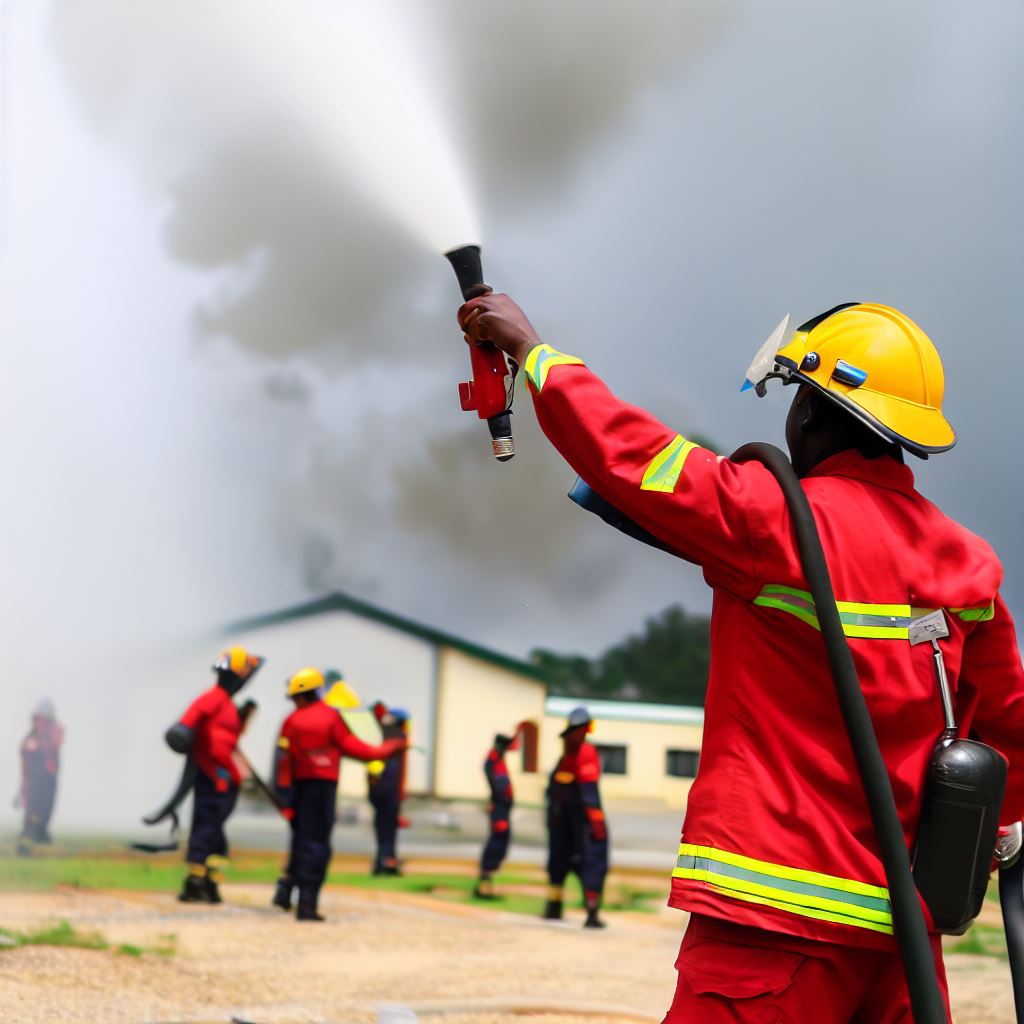
Choosing the Right Fire Fighter Training Course
A. Factors to consider before selecting a course
- Personal goals and career aspirations
- Course content and curriculum
- Reputation and credibility of the training institution
- Cost and financial considerations
B. Tips for researching and gathering information about fire fighter training courses
When it comes to choosing the right fire fighter training course, there are several factors that need to be carefully considered.
These factors will help you make an informed decision and ensure you select a course that aligns with your personal goals and career aspirations.
- Personal goals and career aspirations: Before selecting a training course, take the time to determine your personal goals and career aspirations in the field of fire fighting. Consider the specific areas you want to specialize in and the skills you want to develop.
- Course content and curriculum: Research and evaluate the course content and curriculum of different training programs.
Ensure the courses cover the essential topics and skills required for a successful career in fire fighting. Look for courses that offer a well-rounded curriculum with a mix of theoretical and practical training. - Reputation and credibility of the training institution: It is important to choose a training institution with a strong reputation and credibility in the field of fire fighter training.
Research the institution’s history, accreditation, and reviews from past students. Consider institutions that have experienced instructors with real-world experience in fire fighting. - Cost and financial considerations: Evaluate the cost of the training program and consider your financial situation.
Compare the fees of different courses and determine if there are any additional expenses, such as equipment or uniform costs. It is important to find a balance between affordability and the quality of the training program.
C. Importance of seeking advice from professionals in the field
When researching fire fighter training courses, it is highly recommended to seek advice and guidance from professionals already working in the field.
These individuals have first-hand experience and can provide valuable insights on the different courses available.
- Professionals can offer advice on the reputation and credibility of different training institutions. They can provide an insider perspective on the quality of education and training offered.
- Professionals can also offer guidance on the specific skills and knowledge that are in demand in the fire fighting industry. They can help you identify areas of specialization that will enhance your career prospects.
- Additionally, professionals can provide recommendations on training programs that align with your personal goals and career aspirations. They can share their own experiences and offer insights on the courses that have helped them succeed in their careers.
Overall, seeking advice from professionals in the field can greatly assist you in making an informed decision when selecting a fire fighter training course.
Their expertise and guidance will help ensure you choose a course that sets you on the path to a successful career in fire fighting.
Read: Nigeria’s Fire Fighting: A Day in the Life of a Hero
Explore Further: Networking in Nigeria: Industrial Psychologists’ Community
Common Challenges and Solutions in Fire Fighter Training
During fire fighter training in Nigeria, trainees often encounter various challenges that can hinder their progress and effectiveness in the field.
It is essential to address these challenges and find appropriate solutions to ensure the success and well-being of trainees.
This section will discuss the common challenges faced during fire fighter training in Nigeria and propose strategies to overcome them.
A. Language barriers and communication challenges in training
One significant challenge faced by trainees is language barriers, especially in a diverse country like Nigeria.
Effective communication is vital for efficient training and coordination during emergencies.
To overcome language-related difficulties, implementing strategies such as providing language courses, hiring translators, and using visual aids can greatly enhance understanding and foster effective communication among trainees.
B. Physical demands and health concerns in fire fighter training
Fire fighter training requires utmost physical fitness and strength to perform demanding tasks. Trainees must prepare themselves physically to meet these challenges.
Regular exercise, strength training, and maintaining overall fitness are essential.
Additionally, seeking medical advice and support to address any health concerns is crucial to ensure trainees can perform their duties effectively and safely.
C. Addressing gender disparities in fire fighter training
Fire fighting has traditionally been a male-dominated field, leading to gender disparities in training opportunities.
To address this issue, promoting inclusivity and equal opportunities for all individuals is necessary.
Training institutions should actively recruit and support women in fire fighting, providing them with the necessary resources and training.
Encouraging diversity in the field enriches the profession and ensures a more inclusive and representative fire fighting workforce.
D. Dealing with psychological stress and trauma during training
Fire fighter training can be psychologically demanding and potentially traumatic.
Trainees may face challenging situations that can trigger stress and trauma responses.
Recognizing the importance of mental health support is essential in this context.
Training institutions should incorporate psychological support services, including counseling and debriefing sessions, to help trainees cope with stress and trauma effectively.
Equipping trainees with proper coping mechanisms and resilience-building strategies can contribute to their overall well-being and success in the profession.
In fact, fire fighter training in Nigeria is not without its challenges. However, by implementing appropriate strategies, these challenges can be overcome.
By addressing language barriers, prioritizing physical fitness and health, promoting inclusivity, and providing mental health support, training institutions can create a more inclusive, resilient, and effective fire fighting workforce in Nigeria.
Read: Market Analysis: Coating Technician Demand in Nigeria 2023
See Related Content: Essential Skills for a Fundraiser in Nigeria Revealed
Discover More: Day in the Life: A Nigerian Coating Technician’s Routine
Conclusion
The significance of fire fighter training courses in Nigeria cannot be overstated. It is crucial for ensuring public safety and minimizing the impact of fire incidents.
For individuals interested in pursuing a career in fire fighting, it is highly encouraged to consider appropriate training options available in Nigeria.
This will equip them with the necessary skills and knowledge to effectively respond to fire emergencies.
In the end, the future of fire fighter training in Nigeria looks promising.
With the increasing awareness of the importance of fire safety, there is a growing demand for well-trained fire fighters.
This presents an excellent opportunity for individuals seeking a fulfilling and impactful career in this field.
Remember, fire fighter training is more than just a job – it is a service to the community.
By undergoing the necessary training, individuals can contribute to the safety and well-being of Nigerian society.
So, if you have a passion for helping others and are drawn to the noble profession of fire fighting, don’t hesitate to explore the available training options in Nigeria.
Your dedication and commitment can make a significant difference in saving lives and protecting property.

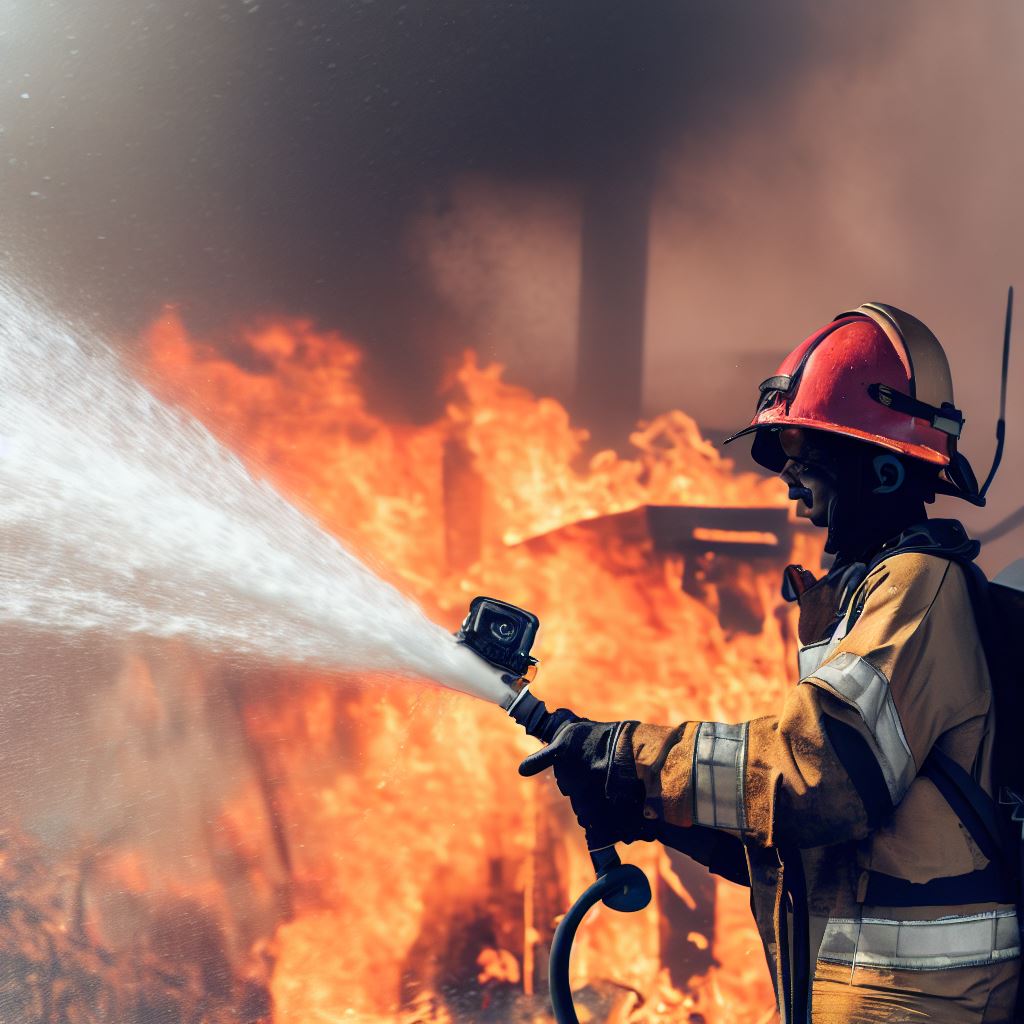
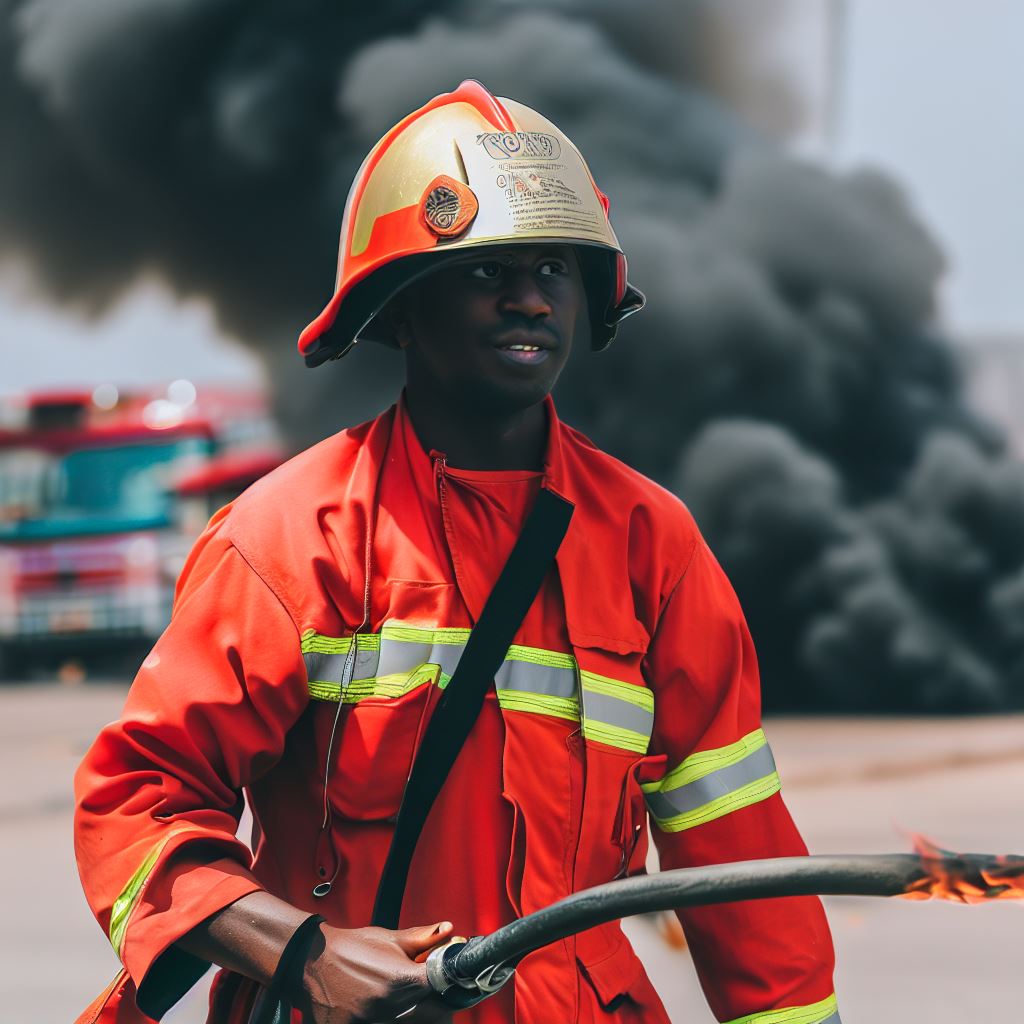
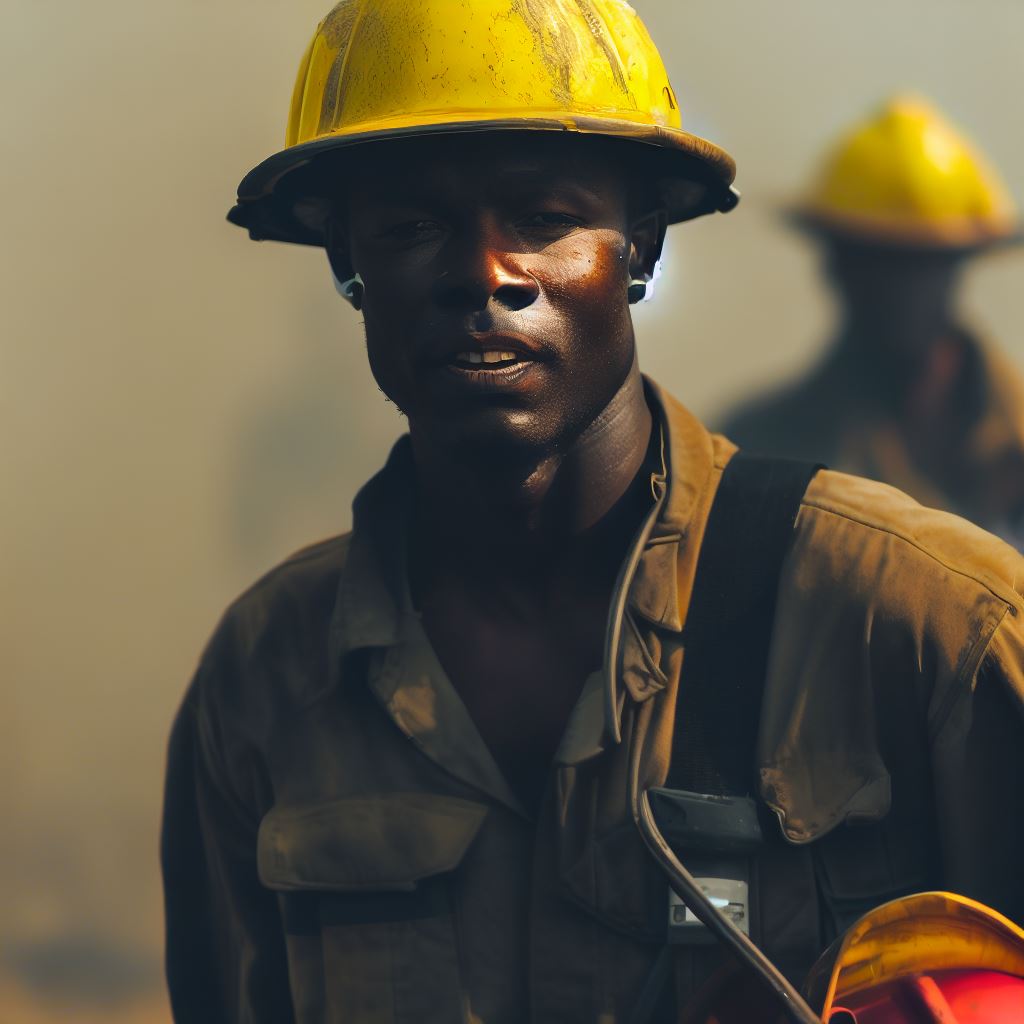
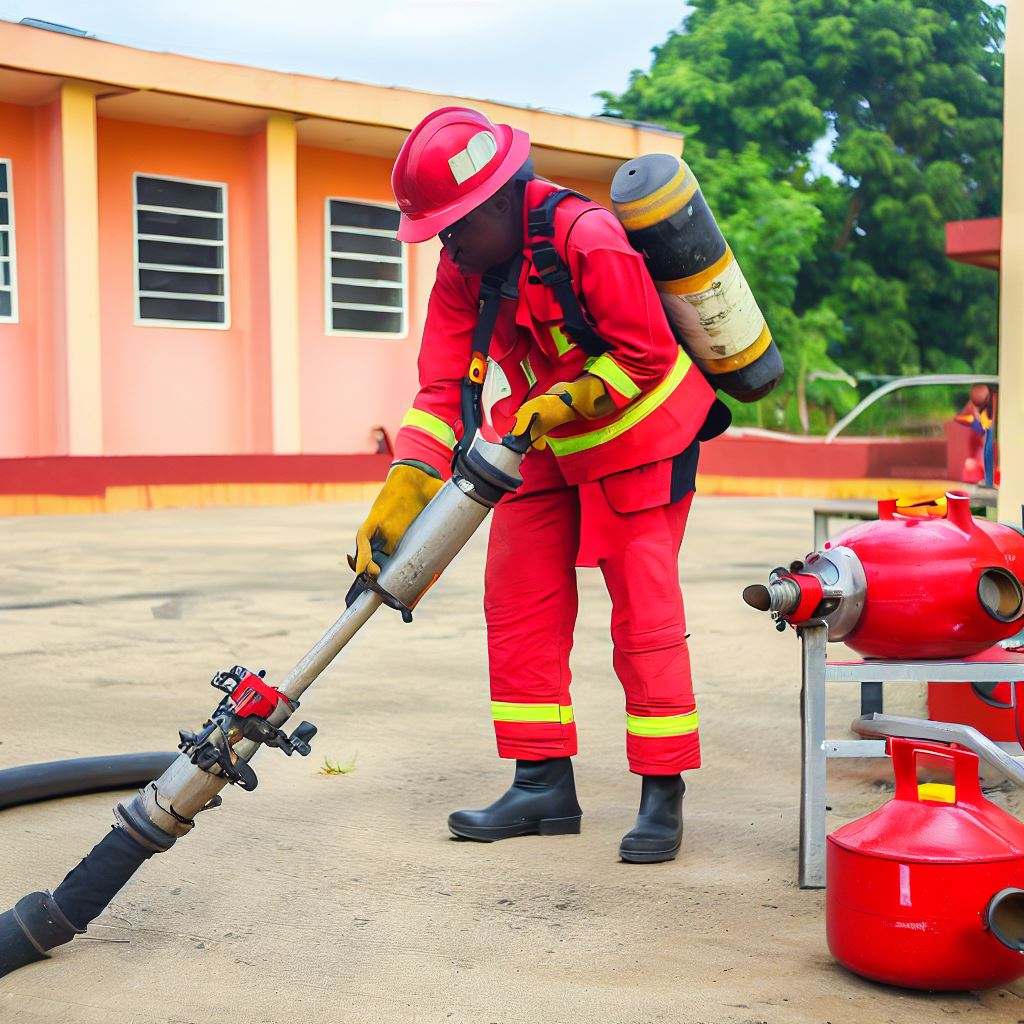
I am getting knowledge on the Nigerian fire training systems
That’s awesome!